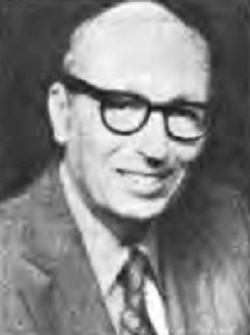 |
Director 1981 Victor C. 'Vic' Clark Falmouth, MA Clifton, VA Annandale, VA QCWA # 3537 Chapter 23 |
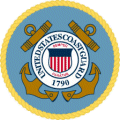 |
If somebody ever came up with a short list of a 'Hall of Fame' for ham radio operators, certainly Vic Clark, W4KFC, would be on it. Vic was a world class CW operator and contest operator. He held many positions in the ARRL, including that of President, and helped to found what has become one of the largest contest clubs in the country, the Potomac Valley Radio Club (PVRC). Hams will never know how much Vic contributed to ham radio and the American Radio Relay League. Vic did not have a big ego, and frequently gave credit to others for his ideas.
Briefly, during the 50 years Vic was licensed, he served the ARRL as Arizona Section Communication Manager from 1937-1939, as Virginia Section Communications Manager from 1952-1954, as an ARRL Assistant Director from the Roanoke Division from 1952-1966, as Director from 1967-74, as IARU Vice President 1974-6, as an IARU Region 2 (South/Central America) President 1976-80, ARRL First Vice President from 1974-80, and ARRL President from 1982-until his death in November, 1983.
Vic won numerous contests, taking first place in CW Sweepstakes in 1947, 1950, 1952, 1958, 1964, and 1965 in the single operator, high power class. Just before he passed away, Vic was speaking at a New York hamfest and he asked the audience how many if them had worked him on the air. Fully three quarters of the audience raised their hand to indicate they had worked him!
Vic was licensed in 1933 as W6KFC. He was 16 years old, and living with his parents in Arizona. Just three years later, in 1936, Vic came in second in the ARRL CW Sweepstakes. Vic was an active contester and traffic handler. In 1936 the ARRL awarded Vic the first Hiram Percy Maxim award to him for his amateur activities.
Vic served with the Federal Aviation Administration from 1941-62, directing the establishment of the Instrument Landing System (ILS) at airports throughout the US and assisting with the implementation of the system in other countries. He then became Director of the US Coast Guard' Electronics Engineering Laboratory in Alexandria Virginia, and retired in 1973. Some of our members may have worked the K4CG station in contests in the mid 1960's and 70's. This station was located in the same building as Vic's office, and certainly Vic helped to initiate and build it.
Vic had a saying that "Activity breeds activity". In other words, any action would encourage more action and reactions-- like a pebble being thrown into the water. Thus Vic spent much of his time encouraging amateur radio activity of any kind. New ham clubs, new repeaters, new contests, any way to broaden the many aspects of amateur radio he would support.
Some years after Vic's sudden death of a heart attack [on November 25] in 1983, a number of PVRC members got together and to tell stories about Vic. These are some of the stories told which everyone connected with swears is true!
From Bill Levitt: "To help celebrate Armed Forces Day, hams were invited in to operate the Pentagon short-wave station WAR, work other hams, and exchange QSL's. Vic and others from the PVRC would go over and work shifts on such occasions. Vic amazed everyone by operating a shift two handed: Using separate receivers and transmitters, he'd write down an signal report being sent to him on one frequency with one hand, while sending 'CQ de WAR' with the other hand on another frequency. As soon as the report was complete Vic would acknowledge by sending an 'R' followed by 'QRZ' and so hook up with the next guy in the queue."
From Noton Richardson, W4KFT, "I was operating in an SS contest calling 'CQ de W4KFT'. When I went to listen someone came right back but not to me, but to W4KFC. Vic was right on my frequency, so I moved off and tried again, but again someone came back to W4KFC and Vic responded. This time, I moved again slightly off frequency, and set the equipment so I could hear between the dots and dashes. What do I hear: 'CQ de W4KFT' and in perfect synchronism a DIT DAH DIT was being inserted by Vic after the 'T' in my call. Vic and I had a good laugh about that at the next PVRC meeting."
Vic himself once told the story to the PVRC club about him accompanying his XYL to the doctor. The doctor said he thought Vic's wife might be expecting. Then he asked Vic "when could that have happened?" Vic looked puzzled and said, "Well, I'll have to go home and check my log!!" The PVRC group knew it was true because he was on the air so much!"
From Jack Colson, W3TMZ (SK) "One day in the 1950's a group of us went over to Vic's to help repair his beam. Vic called CQ on his repaired antenna and a Russian UH8 came back. The UH gave Vic a terrific report and immediately asked him to test his phone on 14250. This was a standard practice for many DX stations in those AM days. Vic, in those days, was CW only and did not have a mike. Vic told the UH station he had no mike, but the UH kept coming back and requesting the QSY. Vic had a 8-inch outboard VFO, So Vic got on 14250, held down his key, and banged the top of his VFO to modulate it. The UH comes back and says "no copy, QRM try again" so this time Vic really gives the VFO a series of bangs and thumps and the UH comes back and says, :solid copy, please QSL." 50 years after the event, the group is still laughing about the event.
From WB4FDT: Back in the 1970's I attended a number of "Roanoke Division League Officials meetings" when Vic was Director. A number of times Vic would have a good idea, and rather than introduce it himself, would try to draw out the same conclusions from other individuals in his discussions with them, and then freely credit them with the idea. For example, the conversation would go something like this: Vic would say: How do you feel about XXXX. After receiving an answer, Vic would continue saying something like, "Well, maybe the ARRL should be doing this about XXXX." After receiving an affirmative answer, Vic would say, .You know, that sounds like a good idea, how about introducing it as a motion before the meeting so I can take it to Newington to work on?. When the motion was introduced, Vic gave the individual full credit for it. I was brave enough to ask him about this once, and he said that he thought new ideas had a better chance of being implemented if it came from a member rather than from a Director.
A historical note about Vic in Virginia. Vic was a founding member of the Virginia CW Net (still meeting today on 3578.5 at 7PM est) in 1947, and remained active until his death. While he was the Virginia Section Communications Manager (now called simply .Section Manager.) in 1952-4 he published a monthly Virginia newsletter which advertised all the amateur radio activities in Virginia during the period. No doubt this publication encouraged amateur radio activity and today it is a gold mine of amateur radio history during this period.
When Vic was IARU Region II President, Vic got the idea that countries should issue stamps (for stamp collectors) honoring amateur radio. This would be great publicity for amateurs in those countries and would give them some government recognition. When Vic urged the member societies to ask their governments to issue stamps, many of them hesitated. Some told Vic that they did not want any undue attention by their governments toward amateur radio or their societies. Many simply did not know how to go about it. Vic kept urging them, and eventually a number of South/Central American countries did issue the stamps, usually honoring the 25th or 50th anniversaries of their amateur radio societies. In 1983, Vic met King Hussein of Jordan, ham call JY1, and urged him to issue a Jordanian ham radio stamp. A few months after Vic died a set of four stamps was issued showing the King in front of his ham station.
(Source: "Spark-Gap Times," OOTC)
-----------------------------------------------------------------------------
VIC CLARK W4KFC
News that Vic, the president of the ARRL, had died of a heart attack reached me at Comdex. I was very sorry to hear that, for Vic was undoubtedly the best president the League has had in many, many years. Indeed, I'd been working with him on the FCC's National Industry Advisory Committee just weeks ago and he had given me a lift to the airport after the meeting, giving us a chance to talk in private.
I had a lot of hopes that 73 and QST would be able to work more closely as a result of our talks since it was obvious that our end goals were similar. Obviously, that wasn't anything I could write about while Vic was alive, and it becomes irrelevant now that he's a silent key.
What a relief it was when the ARRL board elected a president with some brains and with more of an interest in helping amateur radio than basking in the glory of being president. Vic didn't see the presidency as an honor, but as a challenge.
He had his hands full, keeping him from being able to make fast headway. On the one hand, virtually all of the dedicated league old-timers had gotten fed up with Baldwin when he was General Manager and left HQ. And there were still far too many CW forever old-timers on the board, fighting change at every turn. But despite these serious handicaps, Vic was making progress.
Vic, like past president Herb Hoover, Jr, was interested in what he could do for amateur radio. We've had a serious loss.
(Source: W2NSD, 73 Magazine, March 1984)
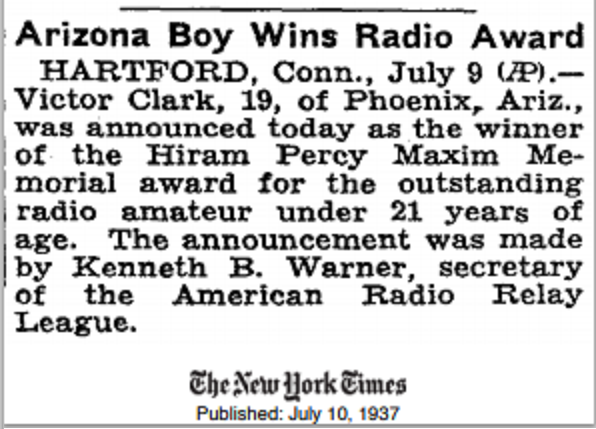
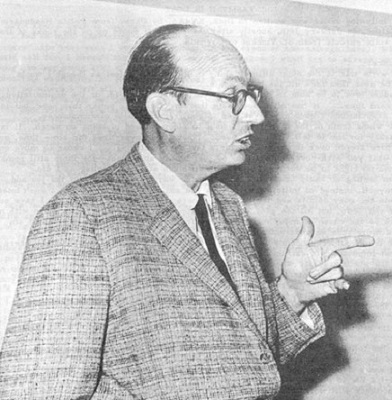
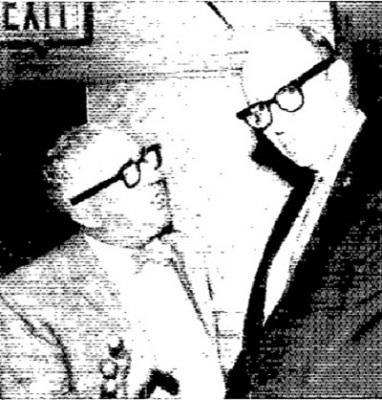
Photo by W8OCT from W4KVX DX Bulletin #64, Feb. 24, 1959 Credit:W1QV (left) with Vic, W4KFC (QST, July 1970)
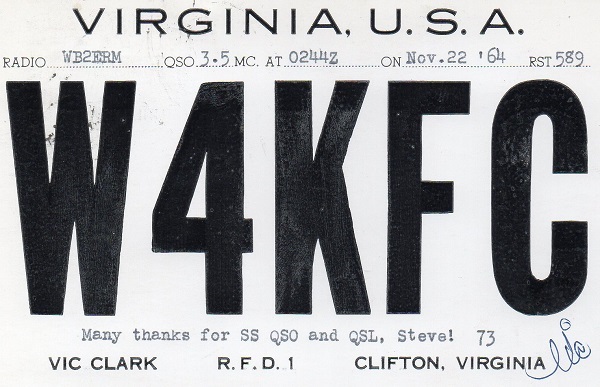
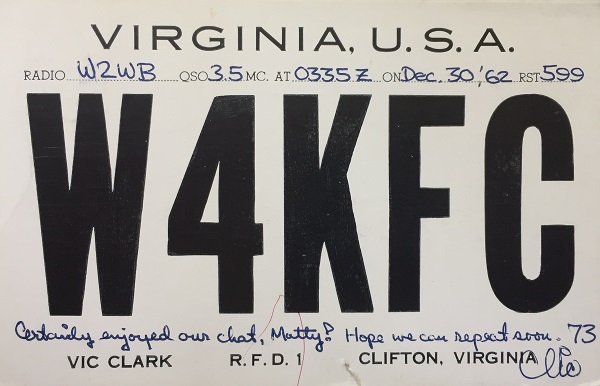
QSL Provided by Pete NL7XM
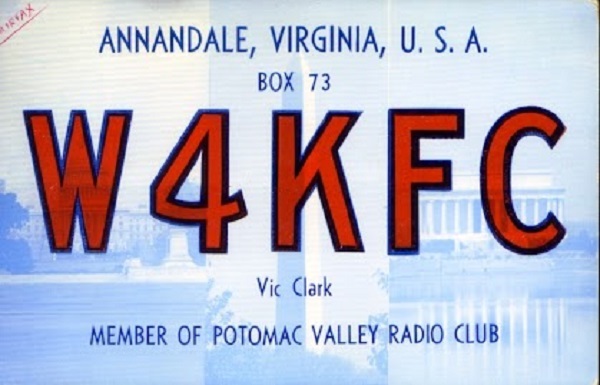
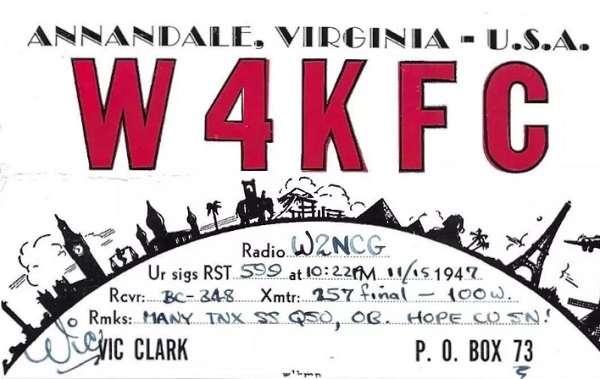
QSL Provided by Pete NL7XM
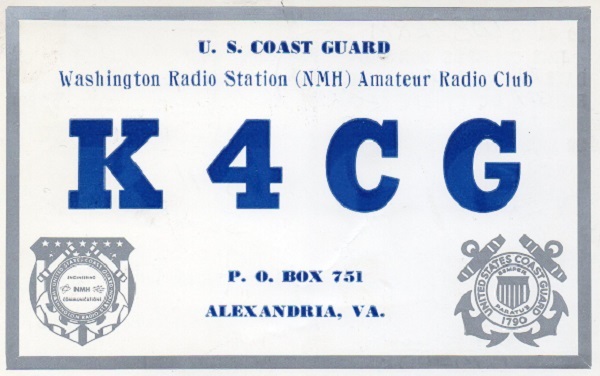
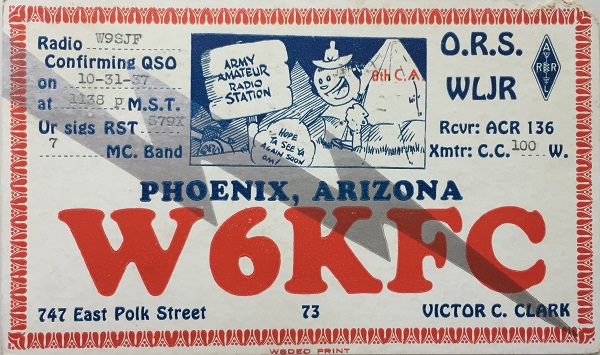
QSL Provided by Pete NL7XM
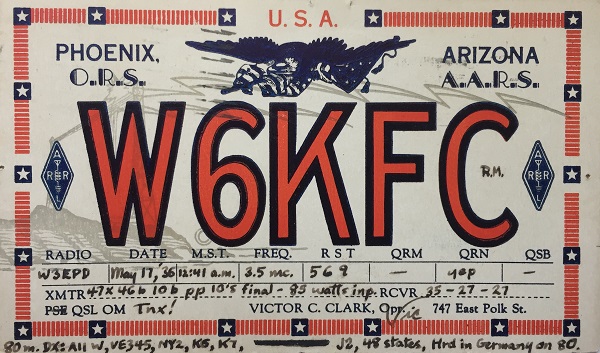
QSL Provided by Pete NL7XM
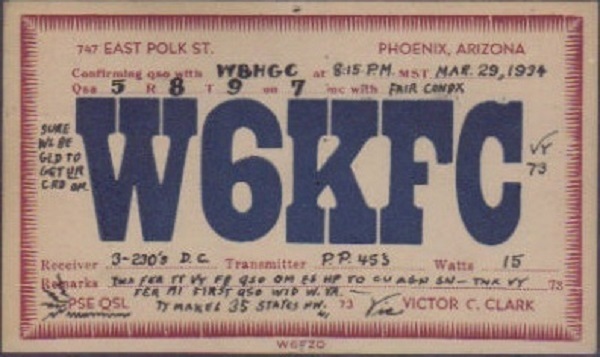
Unless otherwise noted, all graphics borrowed from the National SK Archive